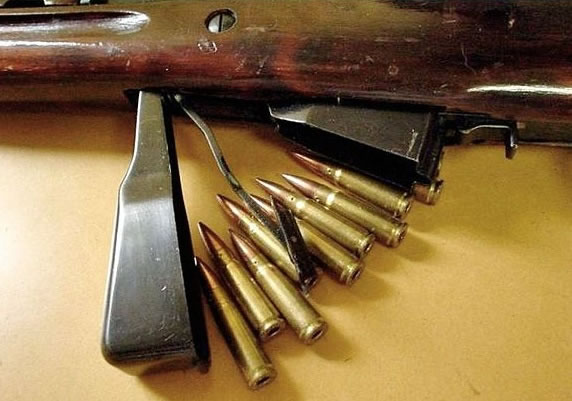Legislators Move to Limit Ammunition Sales and Use

The UN conference on the Arms Trade Treaty ended on July 27th without consensus; the US signaled that it wouldn't support the agreement.
In the wake of the Aurora, Colorado shooting, however, the domestic conversation on gun control has continued. President Obama signaled his interest in stricter gun control and perhaps his unfamiliarity with US gun laws when he said to the National Urban League:
“But I also believe that a lot of gun owners would agree that AK-47s belong in the hands of soldiers, not in the hands of criminals; that they belong on the battlefield of war, not on the streets of our cities.”
One would hope that criminals would not have AK-47s. It is a felony for many criminals to have an AK-47, or any other gun for that matter.
The rifle used in the Aurora shooting was an AR-15-style rifle. The AK-47 referenced by Mr. Obama is the Avtomat Kalashnikova, designed by Mikhail Kalashnikov, a Russian arms designer. Though popular in the US as a sporting rifle, the automatic version is popular in former Soviet states and the developing world as a military gun. The AR-15 is the semiautomatic version of the rifle carried by the military which has Mr. Obama as its Commander-in-Chief.
Since Aurora, there have been two new attempts to pass stricter gun control at the congressional level.
Senator Frank Lautenberg has offered an amendment to the Cybersecurity Bill that would prohibit the sale or transfer of magazines which hold over 10 rounds. While this doesn't criminalize the possession of currently-owned magazines which hold over 10 rounds, it would criminalize the transfer. Interestingly, the problem of inheritance of the magazines wasn't addressed. What's a family to do?
During the now-expired "Assault Weapon Ban," there was a prohibition on the sale and transfer of the same magazines which held more than 10 rounds. Studies conducted after the ban expired showed that there was no discernible effect from the ban. According to those advocating the banning of magazines holding over 10 rounds, since hunters don't need them, there is no reason for them to be sold. The counter arguments are that the Second Amendment does not address hunting, and again, there are no data which show that the ban was effective in combating crime.
Ironically, it could be argued that the 100-round magazine used by the Aurora shooter actually saved lives. As any experienced shooter might tell you, it can almost be predicted that a 100-round magazine would jam, as the shooter's reportedly did. Magazines are a box with a spring at the bottom that push the rounds up into the chamber to be fired. The rounds have to be lined up parallel in order to feed. If they come out of alignment or are pushed too hard or too slow they jam. The larger the magazine, the more likely the jam. Given a 100-round magazine, a jam is almost guaranteed.
In another move, Senator Lautenberg (D-NY) and Representative Carolyn McCarthy (D-NY) have introduced a bill that would all but eliminate the purchase of ammunition online. From Representative McCarthy:
"The Stop Online Ammunition Sales Act works through four components:It requires anyone selling ammunition to be a licensed dealer.It requires ammunition buyers who are not licensed dealers to present photo identification at the time of purchase, effectively banning the online or mail order purchase of ammo by regular civilians.It requires licensed ammunition dealers to maintain records of the sale of ammunition.It requires licensed ammunition dealers to report the sale of more than 1,000 rounds of ammunition to an unlicensed person within any five consecutive business days."
Why would anyone want to buy ammunition online or by mail or phone order? Though perhaps not as commonly as in New York, there are many rural areas of the US where there are not local vendors of ammunition. Online sales of ammunition facilitate the purchase for people living in rural areas.
Another question would be why anyone would want to buy 1,000 rounds or more of ammunition. A simple reason is economics; most ammunition vendors, particularly online vendors, give a discount for purchasing ammunition in units of 1,000. Since ammunition has a nearly-unlimited shelf life and doesn't take much space, buying in bulk makes sense financially.
But is it a lot of ammunition? An active competitive shooter can easily shoot 10,000 rounds a year in practice and competition. 1,000 rounds can be barely a month's worth.
Will limiting the capacity of a single magazine or the ability of a customer to purchase a product in bulk make us safer? An independent voter can make their own decision.




